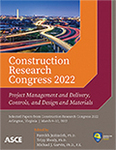Predicting Ratio of Low Bid to Owner’s Estimate Using Feedforward Neural Networks for Highway Construction
Publication: Construction Research Congress 2022
ABSTRACT
State Departments of Transportation (state DOTs) are constantly challenged by accurate estimate cost of highway projects. The significant deviation between the lowest submitted bids and the owner’s estimate is problematic for state DOTs that strive to deliver projects on time and within budget. However, few empirical studies focused on narrowing the gap between low bids and owner’s estimate. The major objective of this research is to enhance the quality of owner’s estimate to more accurately forecast the lowest submitted bid. To achieve this objective, the feedforward neural network in the framework of Friedman’s model is utilized to enhance owner’s estimate. A pool of potential variables to explain the cost variability are selected as input attributes, representing bidding environment, construction market, macro-economic market, and energy market conditions. Bid tabulations for highway construction projects let by the Georgia Department of Transportation (GDOT) from 2010 to 2018 are utilized to conduct empirical study and quantitatively measure the model performance. The outcome shows that the proposed model significantly reduces the deviation between owner’s estimate and the submitted low bid. This study contributes to the body of knowledge through creation of an artificial neural network model that improves the accuracy of owner’s estimate and reduces the gap between owner’s estimate and the lowest submitted bid. It is anticipated that transportation professionals benefit from the results of this study to prepare more accurate cost estimates and budget plans for enhanced decision-making.
Get full access to this article
View all available purchase options and get full access to this chapter.
REFERENCES
Anastasopoulos, P. C., Haddock, J. E., and Peeta, S. (2014). Cost overrun in public-private partnerships: Toward sustainable highway maintenance and rehabilitation. Journal of Construction Engineering and Management, 140(6), 04014018.
Baek, M., and Ashuri, B. (2019). Assessing low bid deviation from engineer’s estimate in highway construction projects. Denver: Associated Schools of Construction.
Ballesteros-Pérez, P., and Skitmore, M. (2017). On the distribution of bids for construction contract auctions. Construction Management and Economics, 35(3), 106–121.
Ballesteros-Pérez, P., Skitmore, M., Sanz-Ablanedo, E., and Verhoeven, P. (2019). Forecasting the Number and Distribution of New Bidders for an Upcoming Construction Auction. Journal of Construction Engineering and Management, 145(10), 04019056.
Carr, P. G. (2005). Investigation of bid price competition measured through prebid project estimates, actual bid prices, and number of bidders. Journal of Construction Engineering and Management, 131(11), 1165–1172.
Cao, Y., Ashuri, B., and Baek, M. (2018). Prediction of unit price bids of resurfacing highway projects through ensemble machine learning. Journal of Computing in Civil Engineering, 32(5), 04018043.
Cheng, M. Y., Hsiang, C. C., Tsai, H. C., and Do, H. L. (2011). Bidding decision making for construction company using a multi-criteria prospect model. Journal of Civil Engineering and Management, 17(3), 424–436.
Crowley, L. G. (2000). Friedman and Gates—another look. Journal of Construction Engineering and Management, 126(4), 306–312.
FHWA (Federal Highway Administration). (2004). Guidelines on preparing engineer’s estimate, bid reviews, and evaluation.
Fine, T. L. (2006). Feedforward neural network methodology. Springer Science & Business Media.
Friedman, L. (1956). A competitive-bidding strategy. Operations research, 4(1), 104–112.
Gates, M. (1967). Bidding strategies and probabilities. Journal of the Construction Division, 93(1), 75–110.
Gkritza, K., and Labi, S. (2008). Estimating cost discrepancies in highway contracts: Multistep econometric approach. Journal of Construction Engineering and Management, 134(12), 953–962.
Gransberg, D. D. (2020). Does low bid award facilitate wrongdoing? US implications of Quebec’s charbonneau commission report. Journal of Legal Affairs and Dispute Resolution in Engineering and Construction, 12(1), 03719004.
Ilbeigi, M., Ashuri, B., and Shayegh, S. (2016). Price adjustment clauses and submitted bid prices for major asphalt line items in highway projects. Journal of Construction Engineering and Management, 142(5), 04015103.
Ioannou, P. G. (2019). Friedman’s bidding model: Errors and corrections. Journal of Construction Engineering and Management, 145(10), 04019058.
Li, M., Baek, M., and Ashuri, B. (2021). Forecasting Ratio of Low Bid to Owner’s Estimate for Highway Construction. Journal of Construction Engineering and Management, 147(1), 04020157.
Li, M., and Ashuri, B. (2021). Proportional Cox Hazards Model to Quantify the Likelihood of Underestimation in Transportation Projects. Journal of Construction Engineering and Management, 147(10), 04021134.
McCaffer, R. (1976). Contractors’ bidding behaviour and tender price prediction (Doctoral dissertation, Loughborough University of Technology).
Liang, Y., Ashuri, B., and Li, M. (2021). Forecasting the Construction Expenditure Cash Flow for Transportation Design-Build Projects with a Case-Based Reasoning Model. Journal of Construction Engineering and Management, 147(6), 04021043.
Qiao, Y. (2019). Bundling Effects on Contract Performance of Highway Projects: Quantitative Analysis and Optimization Framework (Doctoral dissertation, Purdue University Graduate School).
Seydel, J., and Olson, D. L. (1990). Bids considering multiple criteria. Journal of Construction Engineering and Management, 116(4), 609–623.
Shiha, A. (2019). Prediction of construction material prices using macroeconomic indicators: A neural networks model.
Skitmore, M., and Pemberton, J. (1994). A multivariate approach to construction contract bidding mark-up strategies. Journal of the Operational Research Society, 45(11), 1263–1272.
WSDOT (Washington State Department of Transportation). (2012). The Gray Notebook (GNB). Washington State Department of Transportation. June 30, 2012. Retrieved from https://wsdot.wa.gov/publications/fulltext/graynotebook/Jun14.pdf.
Yu, X., Efe, M. O., and Kaynak, O. (2002). A general backpropagation algorithm for feedforward neural networks learning. IEEE transactions on neural networks, 13(1), 251–254.
Information & Authors
Information
Published In
History
Published online: Mar 7, 2022
Authors
Metrics & Citations
Metrics
Citations
Download citation
If you have the appropriate software installed, you can download article citation data to the citation manager of your choice. Simply select your manager software from the list below and click Download.
